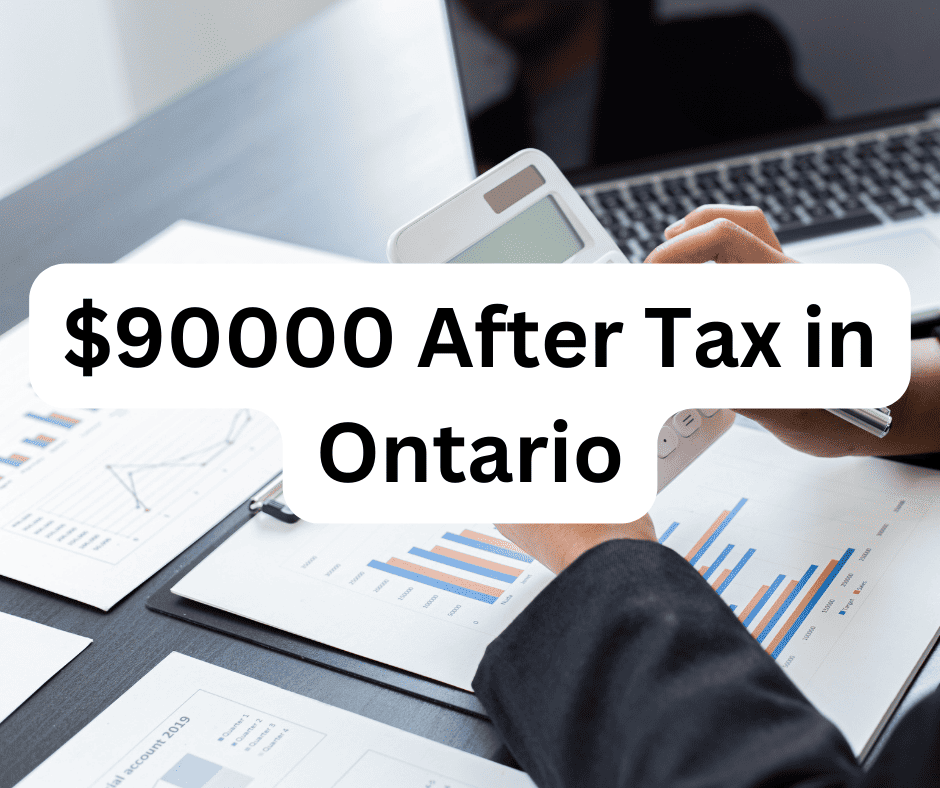A $90,000 annual salary in Ontario translates to a good middle-class lifestyle. However, to determine if this income level allows you to live comfortably, we need to consider the key details:
Tax Rates
Based on the 2023 tax rates in Ontario, an annual income of $90,000 would have the following tax obligations:
- Federal Tax: $12,669
- Provincial Tax: $6,414
- CPP Contributions: $3,500
- EI Premiums: $953
This results in total tax deductions of $23,536.
The marginal tax rate on the last dollar earned at a $90,000 income level is 31.16%. This includes the federal rate of 20.5% and provincial rate of 10.98% (which includes the Ontario surtax).
Take-Home Pay
After deducting the above tax amounts, the annual take-home or net pay at $90,000 yearly income is $66,464.
This works out to $5,539 per month.
Deductions
The major deductions from a $90,000 gross salary are:
- Income tax (federal & provincial): $19,083
- CPP contributions: $3,500
- EI premiums: $953
These account for about 26% of the gross income.
Additional deductions like group benefits would further reduce the net take-home amount.
Comparison to Other Provinces
Compared to other provinces, Ontario has a middle-of-the-road tax burden on a $90,000 income. Provinces like Alberta, Saskatchewan and New Brunswick have lower total tax, while others like Nova Scotia and Newfoundland have higher taxes.
For example, the after-tax income would be $67,706 in British Columbia and $64,707 in Saskatchewan.
Is $90,000 a Good Salary?
In general, an income of $90,000 places a single individual in the top 10-15% of income earners in Ontario. The median household income in the province is around $76,000.
So relatively speaking, this qualifies as a high and comfortable salary.
However, to determine if $90,000 allows you to live well in Ontario, we need to look at the cost of living, especially housing.
Housing Costs
Housing costs can take up a significant part of the budget, especially in cities like Toronto and Ottawa.
Renting a 1-bedroom apartment in downtown Toronto averages around $2,300 per month. For a $90,000 income earner, this works out to about 41% of the monthly take-home pay.
In Ottawa, rents average $1,800 for a 1-bedroom. This accounts for 32% of the take-home amount - on the higher side, but more reasonable.
Outside of the big cities, housing costs drop significantly. For example, average rent for a 1-bedroom unit in St. Catharines is $1,300 or just 23% of the take-home.
Disposable Income
After accounting for basic living costs like housing, food and transportation in Toronto, a single person would have about $1,500 - $2,000 left as disposable income from the take-home $90,000 salary.
This allows for some savings, leisure activities and vacations on a monthly basis.
Someone living in Ottawa or other smaller centers would have $2,000 - $2,500 in disposable income after essential living expenses.
Lifestyle and Savings Potential
A $90,000 salary allows for a comfortable, middle-class lifestyle in Ontario. While those living in Toronto may face more constraints, it is still considered a good income even with the high costs.
At this earnings level, potential savings can range from $15,000 - $25,000 annually across the province. This means financial goals like building an emergency fund, retirement investments, paying off debts and saving towards major purchases are achievable.
Certain trade-offs regarding housing space and expensive hobbies may need to be made depending on individual lifestyle preferences. However, a $90,000 income allows you to meet daily needs, have a decent amount of recreation and entertainment, take 1-2 annual vacations, and make solid long term savings.
Conclusion
While Ontario's high costs of living, especially housing, present challenges - an annual income of $90,000 provides the ability to live comfortably in most areas of the province.
The key is budgeting properly for needs vs wants, and making smart savings and investment choices. But overall, this salary level positions you well to have a great quality of life in Ontario.

